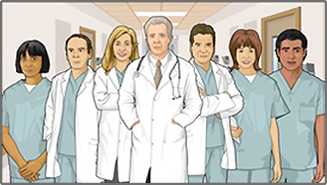Autism spectrum disorder - Asperger syndrome
Asperger syndrome is often considered a high functioning form of autism. It can lead to difficulty interacting socially, repetitive behaviors, and clumsiness.
Asperger syndrome, however, is no longer used as a diagnostic term. While once used to describe someone with autism who did not also have a learning disability diagnosis, it is a part of the autism spectrum and there isn't a need for a separate term.
Autism spectrum
Autism spectrum disorder (ASD) is a developmental disorder. It often appears in the first 2 to 3 years of life. ASD affects the brain's ability to ...
Read Article Now Book Mark ArticleVideo Transcript
Asperger syndrome - Animation
You sense something is different about your child. He appears to have a tough time fitting in with other children. Maybe your child repeats behaviors, like being obsessed about something, again and again and again. Let's talk about what causes Asperger syndrome. Asperger syndrome is often considered a high functioning form of autism. It is more common in boys than girls, but the cause is unknown. More than likely your child's brain just works differently than other children's brains. How do you know for sure that your child has Asperger syndrome? People with Asperger syndrome become obsessed with a single object or topic. They want to know everything about this topic, and may talk about little else. A child with Asperger syndrome will not withdraw from the world like someone with classic autism does. But they may have problems in social situations that lead to isolation. Common symptoms of people with Asperger syndrome may seem like their body language may be off; They may speak in a monotone voice; They may not respond to other people's comments or emotions. They may not understand humor or a figure of speech. They may speak too loudly in social settings. They may have problems with eye contact, facial expressions, or body language. They may have a hard time forming relationships with other people. Problems are usually obvious by the age of 3, but children are often not diagnosed with Asperger syndrome until they are 7 years old. Your child's doctor will look for a group of behaviors. Does your child have abnormal eye contact? Does he fail to turn when called by name? Does he fail to interact with others? So, how do we treat Asperger syndrome? The symptoms of Asperger syndrome can't be cured, but most children improve with behavior management and social skills training. Talk therapy can help your child manage their emotions, repetitive behaviors, and obsessions. Your child may need physical or occupational therapy, to help with motor skills and sensory problems. Speech therapy can help your child learn the skill of everyday conversation. Parents can learn how to help their child grow into well-adjusted adults. With treatment, many children and their families can learn to cope with Asperger syndrome. Your child may always have problems with social interaction and personal relationships, but many children with Asperger syndrome grow up to have good jobs and lead independent lives.
Reviewed By
Neil K. Kaneshiro, MD, MHA, Clinical Professor of Pediatrics, University of Washington School of Medicine, Seattle, WA. Also reviewed by David C. Dugdale, MD, Medical Director, Brenda Conaway, Editorial Director, and the A.D.A.M. Editorial team.
Bang JY, Feldman HM. Language development and communication disorders. In: Kliegman RM, St. Geme JW, Blum NJ, et al, eds. Nelson Textbook of Pediatrics. 22nd ed. Philadelphia, PA: Elsevier; 2025:chap 53.
Bridgemohan CF, Weitzman CC. Autism spectrum disorder. In: Kliegman RM, St. Geme JW, Blum NJ, et al, eds. Nelson Textbook of Pediatrics. 22nd ed. Philadelphia, PA: Elsevier; 2025:chap 58.
Centers for Disease Control and Prevention website. Autism spectrum disorder (ASD). www.cdc.gov/autism/index.html. Updated April 15, 2025. Accessed April 21, 2025.
Chaves-Gnecco D, Feldman HM. Developmental/behavioral pediatrics. In: Zitelli BJ, McIntire SC, Nowalk AJ, Garrison J, eds. Zitelli and Davis' Atlas of Pediatric Physical Diagnosis. 8th ed. Philadelphia, PA: Elsevier; 2023:chap 3.
Sidhu R, O'Banion D, Hall C. Autism and other neurodevelopmental disabilities. In: Jankovic J, Mazziotta JC, Pomeroy SL, Newman NJ, eds. Bradley and Daroff's Neurology in Clinical Practice. 8th ed. Philadelphia, PA: Elsevier; 2022:chap 90.
Disclaimer
© 1997- A.D.A.M., a business unit of Ebix, Inc. Any duplication or distribution of the information contained herein is strictly prohibited.





